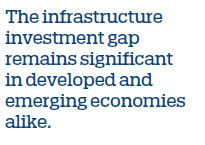Generating sustainable growth a key G20 issue
A key issue for G20 leaders at their annual summit in Osaka will be how to generate sustainable and inclusive economic development and growth across the world in the coming decades.
The G20 accounts for about 80 percent of the world's gross domestic product, and its policies largely determine the health of the global economy.
Ten years ago, the world was facing a financial crisis, the impact of which is still being felt today. G20 leaders met in London to agree to an emergency package of measures to stop the world from plunging from crisis into economic depression.
That crash was driven by unsustainable investments by financial institutions, particularly in the housing market in the United States.
The G20 nations can safeguard against one potential important element in future financial crises by prioritizing wise investments in the transition to zero-carbon and climate-resilient growth and development. An inadequate, slow or badly managed transition can destabilize our economies, slow or reverse growth and severely damage our environment.
Crucial to creating sustainable economies are the quantity and quality of infrastructure. The Global Commission on the Economy and Climate, of which I am co-chair, pointed out in its 2014 report Better Growth Better Climate that $90 trillion would be spent on new infrastructure between 2015 and 2030, mostly in developing countries.

This investment will double the amount of infrastructure in the world. If it is similar to our existing infrastructure, it could lock in pollution, waste, inefficiency and climate vulnerability. It could prevent the world from realizing its collective international ambitions, including the United Nations' Sustainable Development Goals and the Paris climate agreement.
A report published earlier this year by the World Bank highlighted the huge need for infrastructure to eliminate poverty and raise living standards, with 940 million people living without electricity, 663 million lacking adequate sources of drinking water, 2.4 billion lacking decent sanitation facilities, 1 billion living more than 2 kilometers from an all-season road, and 4 billion lacking internet access.
It found that the spending of developing countries on infrastructure was mostly 3.5 to 5 percent of gross domestic product.
The report concluded that developing countries should be able to build the infrastructure necessary to realize the Sustainable Development Goals through investments equivalent to about 4.5 percent of their GDP.
The G20 nations must lead by example on this imperative, and especially the world's two biggest economies, the US and China.
US President Donald Trump has recognized the need for better infrastructure, while China is demonstrating leadership through significant investments in zero-carbon energy, particularly renewable power.
China can provide even greater leadership through the Belt and Road Initiative if it encourages the application of robust sustainability tests to investments in new infrastructure in partner countries.
It is not in the interests of China or its partners to waste money on infrastructure that is incompatible with the development of a zero-carbon, climate-resilient economy.
The G20 nations should be wise with their investments within their own countries and abroad. They should promote the role of international financial institutions and multilateral development banks in particular.
Multilateral development banks have a vital role as a partner to investments in sustainable infrastructure and in reducing the risks for other investors by fostering and supporting good policy.
The leadership of the Asian Infrastructure Investment Bank, a multilateral development bank based in Beijing, recognizes the urgent need to increase efforts to attract private capital for sustainable infrastructure.
The leaders' declaration from the G20 Summit in Buenos Aires last year recognized that "infrastructure is a key driver of economic prosperity, sustainable development and inclusive growth". It endorsed the "road map to infrastructure as an asset class".
The road map pointed out that private savings in the hands of institutional investors are currently at an all-time high of $80 trillion in assets under management. Yet the infrastructure investment gap remains significant in developed and emerging economies alike.
The aim of the road map is to address common barriers to the emergence of infrastructure as an asset class, including the heterogenous nature of infrastructure assets, the lack of a critical mass of bankable projects and insufficient data to track asset performance.
Through such leadership, the G20 nations can promote sustainable economic growth and development, reduce poverty and improve living standards across the world. They can lay the foundations for a sustainable future. But they must move quickly and on scale.
The author is the chair of the Grantham Research Institute on Climate Change and the Environment at the London School of Economics and Political Science. The views do not necessarily reflect those of China Daily.
(China Daily Global 06/21/2019 page1)


















